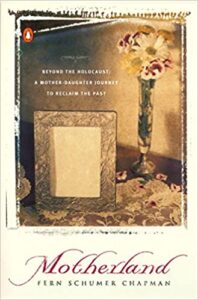On my first trip to my mother’s town, Stockstadt am Rhein, I wondered if there would be any physical evidence of her past.
“What can remain of a family destroyed fifty-two years earlier?” I wrote in my memoir, Motherland. I learned then that the past has peculiar ways of inserting itself into the present.
When we first arrived in Germany, my mother turned to me and said, “We can’t leave Germany without seeing Mina.”
“Who’s Mina?” I asked.
“She was like a sister to me,” my mother replied. This was a surprising, given that the Holocaust had robbed her of so many family members and friends.
It turned out, Mina, a young Christian woman, had lived with my mother’s family, helping with chores in exchange for room and board. She came to love the family deeply, and her allegiance to the Westerfelds compelled her to speak out and defy the Nazis. During those difficult days in the 1930s, she often proclaimed, “I will not howl with those wolves!”
Ostracized for her beliefs, she fled Stockstadt and eventually made a life far away from the place where her family had lived for generations. When my mother and I found her in a tiny hamlet in the Odenwald Mountains, she told us a chilling story about a cherished child’s tea set.
“The tiny teapot, creamer, and cups came from your wealthy relatives who lived in Cologne,” Mina said. “The relatives had sent the set to us around Christmas one year. We begged your mother (my grandmother) to let us play with it. ‘No,’ she said. ‘The tea set was too fancy and fragile.’
“But in 1938, when she knew she had to send you (my mother) to America, she gave in. Just before you left, she allowed us to play with the tea set all the time.”
During our meeting in 1990, Mina reached into a paper bag, pulled out and unrolled wads of yellowed newspaper, revealing the small porcelain tea set with faded, hand-painted gold flowers painted on a royal blue border.
“I went to visit Frau Westerfeld in 1942, who, by then, was living in a ‘Jew-house’ in Darmstadt,” Mina explained. “The Nazis had forced all Jews in the area to live in one building.
“The last time I saw your grandmother, she was hungry and frail. She said she had to sell her children’s old toys for money to buy food. But when she came upon the tea set and remembered how we played, she looked at me, held up the teapot and said, ‘Maybe you would like these? Willst du sie haben?‘”
“The tea set belongs in your family,” Mina said to me during that meeting fifty-two years after her visit with Frau Westerfeld. Then she held up the teapot and asked, “Willst du sie haben?“
Link to the memoir, MOTHERLAND: https://www.amazon.com/Mother…/dp/0140286233/ref=sr_1_7…


